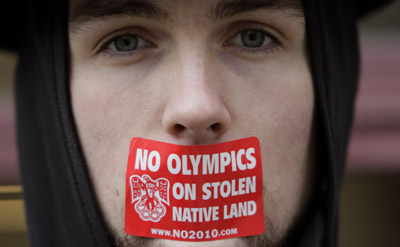New York, February 12, 2010—The Committee to Protect Journalists is concerned about reported border incidents involving journalists attempting to enter Canada from the United States to cover protests and other events related to the Olympic Games, which begin tonight.
John Weston Osburn, a Salt Lake City freelance journalist associated with the news organization IndyMedia, was interrogated and denied entry by Canadian border authorities near Vancouver on Tuesday due to a past conviction for a misdemeanor, according to a report by Vancouver Media Co-op. After being turned away by Canadian authorities a second time at the same crossing, Osburn was interrogated by U.S. border authorities who detained him for two hours and searched through his journals, computer and digital camera, the journalist told Vancouver Media Co-op in an interview. The interview was rebroadcast on the U.S.-based syndicated broadcast program, “Democracy Now!”
A second journalist, Martin Macias Jr., a contributor to Vocalo, an online news outlet and affiliate of Chicago Public Radio, was detained for two hours and interrogated by Canadian authorities on Saturday, before being turned away and put on a plane to Seattle, according to a report in the Huffington Post. Macias was planning to attend a press conference by the Olympic Resistance Network, a group critical of the games.
“I was in the passport line in Vancouver,” Macias is quoted saying on Huffington Post, “and I told them I was a radio journalist and a student at Malcolm X College. The agent put a big circle and x on my ticket. I was pulled out the line and questioned aggressively for two hours. They wanted to know what I was going to do in Vancouver, who I was meeting with, who organized the conference, and what they looked like. They took all my contact information and business cards of journalists and other people I was to connect with while in Vancouver.”
Canadian authorities provided no explicit reason for denying entry to Macias, according to press reports.
CPJ has documented two other incidents of harassment related to the Olympics. In December, news videographer Ian Robertson was shoved to the ground and struck in the head by Canadian security officers in Toronto while covering the Olympic torch relay. Robertson was hospitalized with a concussion, according to the Canadian Press. Another journalist, photographer Dave Thomas, was pushed several times by officers but was not injured, the Canadian Press reported. Canadian officials told the Canadian Press that the officers acted in an “appropriate manner.”
In November, the host of “Democracy Now!” was detained by Canadian authorities for 90 minutes when she tried to cross the border near Vancouver. Host Amy Goodman, who had been invited to speak at Vancouver Public Library about her new, unrelated book, was issued a limited visa stipulating that she had to leave Canada within 48 hours.
Jennie Chen, a spokeswoman for the Canadian Embassy in Washington, said she could not discuss specific incidents because of privacy restrictions. In general, she said, travelers seeking to enter Canada are assessed on a case-by-case basis based on considerations that include security. Chen said authorities did not alter admission standards for the Olympics.
Joanne Ferreira, spokeswoman for U.S. Customs and Border Protection in the Department of Homeland Security, said the agency would not discuss specific cases.
“Canadian authorities should clarify why these journalists have been prevented from entering the country to cover the Winter Olympics and related events,” said CPJ Deputy Director Robert Mahoney. “Silence reinforces the impression that a journalist who intends to cover protests around the Games risks being denied entry.”
